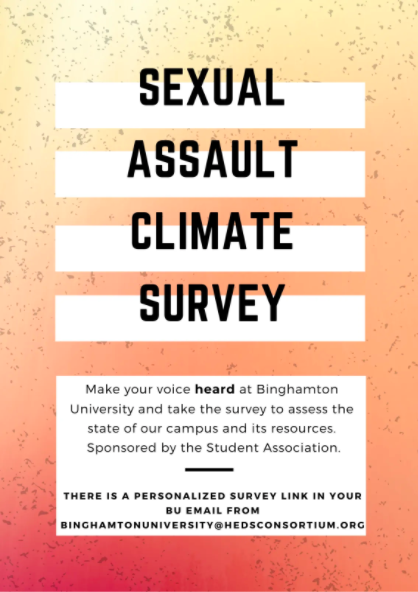As part of its sexual assault education initiative, the Student Association (SA) is partnering with the Higher Education Data Sharing (HEDS) Consortium to distribute a sexual assault campus climate survey to all students enrolled at Binghamton University this spring.
HEDS is a nonprofit consortium that works in conjunction with colleges and universities, both public and private, to distribute data. Its sexual assault campus climate survey aims to collect a range of data depicting how students view their campus’ climate surrounding sexual assault, BU’s response to sexual assault and whether a student has experienced unwanted sexual contact or sexual assault. According to the HEDS website, a feature designed to anonymize responses is activated upon either partial or full completion of the survey to remove all personal identifiers, such as names, email addresses, IP addresses and specific login information, from all responses.
Emma Ross, SA president and a senior double-majoring in political science and psychology, said she has been working toward conducting the survey since her election last spring.
“I began researching multiple outside agencies to see which organizations had the best climate surveys and which one was the best fit for our campus,” Ross wrote in an email. “I decided this was necessary for our campus because [BU] has never had a climate survey specific to our campus regarding sexual assault, and it is imperative that we know what our students are facing with this critical issue.”
In accordance with SUNY policies, BU participates in the biennial SUNY Uniform Campus Climate Survey, according to Nasrin Fatima, associate provost for institutional research, effectiveness and planning.
While the SUNY survey allows BU to compare its data with other SUNY institutions, Fatima said the HEDS survey will allow BU to also compare its results with other public universities outside the state, as well as private colleges.
“The HEDS Sexual Assault Campus Climate Survey results can help [BU] understand more fully the sexual assault climate,” Fatima wrote in an email. “Moreover, it can provide us with a baseline as well as allow us to compare ourselves with other similar institutions. It can help us dispel certain myths and help us identify areas we need to improve on.”
According to Lisa Kidd, research analyst and data manager at HEDS, more than 124 institutions have participated in the survey, garnering more than 64,000 student responses since 2014. Kidd said HEDS hopes to assist these institutions in enhancing their safety measures while improving their students’ experiences.
“We love what we do,” Kidd wrote in an email. “We have the opportunity to work with forward-thinking institutions all across the country that want to know more about where they stand with their student body, what their strengths are in delivering important elements of that post-secondary experience and what opportunities exist to improve the student experience on all levels.”
Ross said the SA plans to work with BU’s administrators to enhance both the University’s resources and the education it offers to students regarding sexual assault.
“I think the first step is really transparency,” Ross said. “Several of the questions in the survey are aimed at finding out if the University is doing a good job of educating students on our resources and where the University needs to improve its efforts. By being able to see which resources need more publicity and focus, we can tackle one issue.”



